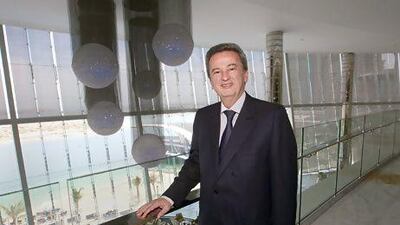Lebanon is looking to business chiefs among the UAE diaspora to boost deposits at home as it seeks to increase lending and stave off further economic shocks from Syria's unravelling crisis.
The Lebanese central bank governor, Riad Salameh, met Lebanese businessmen in Abu Dhabi yesterday, a day after the prime minister, Najib Miqati, resigned amid political deadlock with Hezbollah, the Shiite militant and political movement.
In January, the banking regulator injected US$1.5 billion (Dh5.5bn) into Lebanon's banking system to help finance housing and other sectors that are "key to social stability" and growth, Mr Salemeh said.
Last month the country's central bank found buyers for $2.2bn of $3bn in bonds offered for sale.
It also exchanged deposit certificates due this year and next for ones with maturities of seven to 10 years.
"Lebanon is living a crisis," Mr Salameh said yesterday. "From the start of the year, the regulator took into account that 2013 was going to include many crises. On the one hand, we have had problems related to the parliamentary elections, and on the other we have experienced the fallout from Syria's turmoil and the resulting slowdown on investment and activity in Lebanon."
Tensions in Lebanon have risen since the popular uprising seeking to unseat the Syrian president, Bashar Al Assad, reignited dormant yet highly eruptive divisions in Lebanese politics.
Clashes broke out yesterday in Tripoli, home to a Sunni Muslim majority, which is largely supportive of Syria's Sunni-led uprising.
Mr Miqati, who is a Sunni, on Saturday resigned from his post as prime minister after Hezbollah refused to ratify a decision to extend the term of a senior security official and to approve the creation of a body to oversee the June parliamentary elections.
"Now it is important for dialogue to begin and for a salvation government to be established during this difficult period," Mr Miqati said on Saturday from his official Twitter account after submitting his resignation to the president. "I thank God that I Ieft office the same way I came in, with integrity."
The political fallout has sharpened the economic challenges facing Lebanon, after some Arabian Gulf states last year warned their citizens against travelling to the country. The decision by the UAE, Qatar and Saudi Arabia cut much-needed tourism revenues for Lebanon.
Profits plunged at Lebanon's banks as they wrote down bad loans to their customers in Syria after uprisings and international sanctions took their toll on the country's economy.
Mr Salameh appealed to the Lebanese businessmen yesterday to help shore up remittances, the country's main source of foreign exchange.
Lebanon receives $8bn annually in remittances, according to data from the World Bank. Some 40 to 50 per cent of this comes from the Gulf, Mr Salameh said. The IMF expects Lebanon to register growth of 2 per cent for last year and 2.5 per cent for this.

